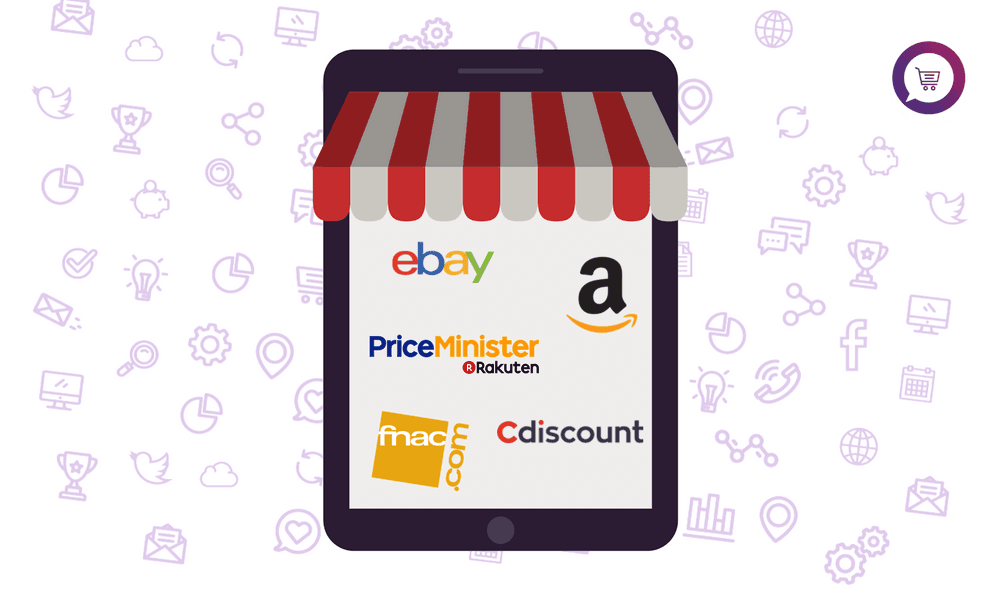The E-commerce market is saturated, we’re all quite aware. It’s timely and costly to launch your own site, and starting an E-commerce from the ground up means you need to be an expert in everything (as with any entrepreneurship). However, marketplaces exist to make that process easier, and allow you to focus on what your core business is, and most importantly, your strengths.
Today, marketplace models are offering development opportunities to help your E-commerce get off the ground, and it might not be a bad idea to take a look at them. Normally, they’re relatively cheap in terms of what you have to pay to be hosted, and they have already done the SEO and referencing work so you won’t have to.
Being present in prominent marketplaces is an excellent way to grow your sales whether you have your own dedicated site or not. The name of the game is visibility.
A marketplace hosts and sells your products for you, or even allows you the opportunity to have your own store, like homemade and craft platform Etsy. The technical platform is in place for sellers to easily create catalogues for their products and reference them, manage orders, offer secured transaction options, and even sometimes manage store stock.
There are several marketplaces that are highly visible that we all know and use: Amazon and eBay are the top giants, with several others that are more adapted for different niche domains. With that, there are clear advantages to using a marketplace to sell your products.
Main advantages of using marketplaces for E-commerce professionals:
Gain visibility outside of your habitual audience
The top reason to host your products on a marketplace is the opportunity to gain visibility outside of the normal traffic that visits your site. There are targets that perhaps weren’t interested in your products on your site (perhaps a lack of trust on a newer E-Commerce site) but would purchase from a prominent marketplace.
Liquidate slow-selling stock
Several E-commerce sites use marketplaces to liquidate the overstock they have. Instead of just letting it sit and going through sale after sale, selling on a marketplace can get a product to sell at less of a discount while freeing up your inventory space for new products.
Concentrate your SEO on a smaller line of products
This is the best way to go about acquiring new traffic for your site. Traffic acquisition is expensive for an E-Commerce site, which would need quite a bit of investment in a proper SEO and Social Media strategy.
Focusing on a smaller range of products allows you to save time and money on your SEO strategy. This allows for a more effective referencing strategy that will reach more customers.
Customer Experience in Marketplaces
Customers know and trust prominent marketplaces, and they typically have accounts on successful marketplaces. Customers shop on marketplaces for 4 main reasons:
- Attractive prices: where there’s competition, there are attractive prices.
- Availability of products: marketplaces typically have high demands when it comes to availability of stock. Out-of-Stock items tend to be rarer.
- Trust: Sellers are rated, which reassures the buyer who is looking for a company that’s serious and reliable.
- Choices, choices: there is a large range of products to choose from.
Marketplaces offer Innovation
In order to stay competitive, marketplaces often implement new innovations in E-commerce that give an enhanced customer experience to their customers. Hosting in a marketplace allows you to benefit from these innovations on a smaller budget. Imagine being able to implement customer loyalty programs at a fraction of the cost!
Criteria for Choosing a Marketplace
There are several things to consider to sell in a marketplace. It’s easy to choose the biggest ones and be done with it- but in doing that you are offering yourself up to the mercy of the competition that comes with giant marketplaces. Going with a marketplace that is well adapted to your type of product can dramatically increase your sales. Here are the main criteria you should take into account when choosing the right marketplace for your products:
Product Referencing
If SEO strategy is your game, a marketplace that has excellent referencing for their products will get you the visibility you’re looking for. We all know how important the #1 spot in a Google search is, so choosing a marketplace that will appropriately reference your products is key to higher conversions.
Certain marketplaces are more visible than others, but the key is finding the precarious balance between excellent referencing and marketplace saturation.
The best way to figure out if your niche marketplace is right for your products, it’s important to check in a search for your type of product and see what comes up first.
Product Categories
Marketplaces tend to regroup their hosted products into several different categories. These categories help your customers narrow down their search and are key to making sure the right customers are finding your products. The choice depends on your strategy: targeting quality customers or choosing the highest visibility categories for the most traffic.
Costs
Normally, being present on a marketplace isn’t free. There is usually a minimum monthly subscription in order to host your products. For smaller E-commerce sites, a higher cost brings more risk. These platforms typically take 9-20% off the top of the sales. These costs are variable depending on the site and sometimes, the volume of sales.
Ease of use and Payment Security
Marketplaces tend to have the budget to offer several different kinds of payment options, like Paypal and multi-payment options in addition to just credit card payment. They often offer their own security on the site by securing with SSL certificates. This solves the problem of trust with online customers and helps reassure them.
A great site to compare different marketplaces is Where to Sell Online. This site offers a comparison of the largest marketplaces by price, traffic, tools, and etc. They also offer reviews on each of the most prominent marketplaces with individual pros and cons for a more detailed approach.
How to sell in Marketplaces like a Boss
So you know why you should sell in marketplaces, and how to choose the best marketplace- but we’re not done yet! How should you go about selling in a marketplace in a way that will drive your overall conversions without undermining your E-commerce site?
Which products should I sell in Marketplaces?
Start by avoiding your best sellers. The idea is to bring traffic to your site from the marketplace, not having the marketplace steal all your traffic. So keep your best sellers on your site and make loyal customers out of those who come back to your site.
Sell the rest of your catalogue: the products that have been collecting dust in your inventory that you have trouble getting rid of and accessories of your best sellers, which typically have great margins.
It’s a lot better to sacrifice a bit of these margins in a marketplace to improve sales volume, and consequently, your profits in making your inventory scalable.
What information should I put on the marketplace?
Make sure you put information on the marketplace about your products. Don’t skip out because it’s not your own site. You need to make any and all information necessary to sell your product available to your marketplace customers. That being said, don’t copy and paste your catalogue description. This will cause an error in your SEO by making your marketplace content a duplicate. You want to write unique, rich descriptions for your products in the marketplace.
Marketplace selling isn’t only for the green looking to dip their toes into the E-commerce waters. It can be a great strategy even for the largest stores to drive traffic back to your site. When implementing a proper strategy, it can be an extra boost for your E-commerce.
What’s your experience with using marketplaces? Let us know below, ortweet us!





